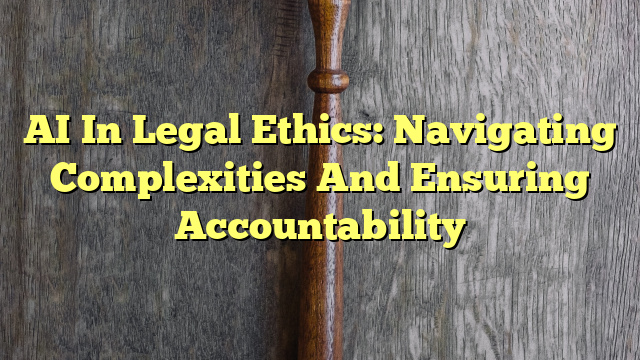Table of Contents
- Introduction
- Accountability in AI Ethics
- Ethical Issues of AI in Law
- Ethical Frameworks for AI
- Important Principles in AI Ethics
Introduction
Advances in artificial intelligence (AI) technology and its application in the legal field are rapidly increasing. As AI technology becomes more powerful and sophisticated, there are ethical considerations that must be taken into account when implementing AI in legal matters. AI can significantly improve the efficiency and accuracy of legal processes, but unless properly regulated, it can also lead to increased bias and unjust outcomes.
This article will explore the complexities of AI ethics in the legal field, focusing on the need for accountability and the ethical frameworks that need to be established to ensure proper accountability. It will then examine the ethical issues associated with AI in law, and the four ethical framework principles for AI. Lastly, it will discuss the two most important principles of AI ethics.
Accountability in AI Ethics
As AI technology has become increasingly powerful and its applications in the legal field have grown, so too has the need to ensure accountability for its use. AI has the potential to automate and streamline legal processes, but if it is not properly regulated, it can lead to increased bias and unjust outcomes. For this reason, it is essential to ensure accountability when it comes to using AI in legal matters.
Accountability is an important principle in the ethical use of AI, and it is essential to ensure that the decisions made by AI-driven systems are fair, transparent, and just. This means that the developers and users of AI must take responsibility for the decisions made by the AI system, as well as for any unintended outcomes that may arise. It also requires that the developers and users of the AI system adhere to a set of ethical guidelines in order to ensure that the decisions made by the AI system are as fair and unbiased as possible.
Ethical Issues of AI in Law
The ethical issues associated with AI in law arise from the potential for AI systems to be used in ways that are unfair or biased. AI systems can be used to automate important legal decisions, such as sentencing in criminal cases. If the AI system is not properly regulated, it could lead to decisions being made that are not in line with the law or with ethical principles. Additionally, AI systems can be used to identify and target vulnerable populations, such as minorities or people with certain disabilities, making them more likely to face unfair outcomes.
In order to ensure that AI is used ethically in the legal field, it is essential to establish a set of ethical principles and guidelines that will ensure that AI systems are used responsibly, and that any decisions made by AI systems are fair, transparent, and just. This requires that AI systems are developed in a way that ensures accountability for any decisions made, as well as for any unintended outcomes that may arise.
Ethical Frameworks for AI
In order to ensure the ethical use of AI in the legal field, there are four ethical framework principles that must be followed. These principles are: fairness, transparency, accountability, and privacy. Each of these principles is essential to ensuring that AI is used responsibly and ethically, and that AI systems are developed in a way that ensures the decisions made by the AI system are fair and just.
The principle of fairness is essential to ensure that AI systems are not used to discriminate against certain populations. This principle requires that AI systems are developed in such a way that any decisions made by the AI system are based on objective criteria, and that any potential biases are minimized. The principle of transparency requires that AI systems are developed in such a way that their decisions are easily understood and that their decision-making process is transparent and can be reviewed. The principle of accountability requires that the developers and users of AI systems are held accountable for any decisions made by the AI system, as well as for any unintended outcomes that may arise.

